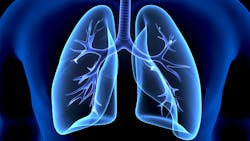A new study led by Cedars-Sinai investigators suggests HER2 signaling may be a key driver of fibroblast invasion and can serve as a target for therapeutic intervention in idiopathic pulmonary fibrosis.
HER2 is a gene that produces a protein found on the surface of breast cells. A mutation of the gene can lead to overproduction of the protein and is associated with a type of breast cancer. Using single-cell RNA sequencing, the team examined the activation of HER2 in lung fibroblasts and saw that it led to a more invasive genetic program and worsened fibroblast invasion and lung fibrosis. But antagonizing HER2 signaling blunted the progression of lung fibrosis in a humanized animal model of pulmonary fibrosis.
Idiopathic pulmonary fibrosis, a fatal disease within five years of diagnosis for most patients, is characterized by excessive recruitment of collagen-producing fibroblasts to sites of tissue injury. This results in excessive lung scarring associated with severe patient morbidity. The molecular mechanisms that drive the proliferation of the scarring fibroblasts is not completely understood, hindering effective treatment.
Current therapies approved by the Food and Drug Administration (FDA) do not improve lung function, prolong life, or target the underlying mechanisms that drive disease progression and unremitting lung scarring. In this study, Cedars-Sinai investigators, led Paul Noble, MD and Dianhua Jiang, MD, PhD, looked to see if targeting the fibroblasts destroying lung tissue as if they were like cancer spreading in the body could be a better approach to treating and curing idiopathic pulmonary fibrosis.
The research was published in the peer-reviewed Journal of Experimental Medicine.

